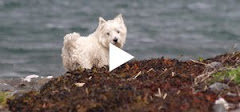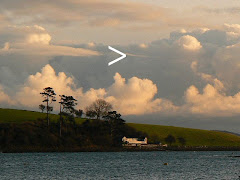'The cold north wind they call La Bise
Is swirling round about my knees,
Trees are crying leaves into the river..'
It's always been a favourite, and in the rather serendipitous way that life throws up unexpected connections, I found myself humming the song on a visit to Down Museum in Downpatrick. The museum is housed in the town's restored 18thC prison, and one wing is given over to installations and art exhibitions.
The Governor's Quarters, Downpatrick Gaol
The current exhibition, called Our Town, has views of Downpatrick by various noted artists, living and dead, and I stopped in front of this charming watercolour by Lydia De Burgh:
My mother used to be a keen painter and knew Lydia De Burgh, who lived near the family home in Seaforde, Co.Down; and in fact I remember meeting her myself many years ago, when as a teenager I exercised the horses - riding one, leading two (something you wouldn't see these days) - on the little country road that ran past her house. The De Burghs can trace their ancestry to many of the principle movers and shakers of European history, including Charlemagne and the man responsible for the world's most famous tapestry, the arrestingly-named Odo, Bishop of Bayeux.
Anyway, Lydia, who died in 2007, was Chris De Burgh's aunt. So there - he's practically a best friend.
***
'La Bise' is the name given to the northerly wind which blows from northeastern France to south of the Masif Central (where it is known as 'la bise noire'). The derivation is unknown, but it's striking that 'la bise' is also a colloquialism for a greeting - or parting - kiss on the cheek; and I find it entirely possible that at some point in history it occurred to someone that the dry North wind was given to planting a passing peck on France's left cheek as it swept through from north to south.
.jpg)
.jpg)














